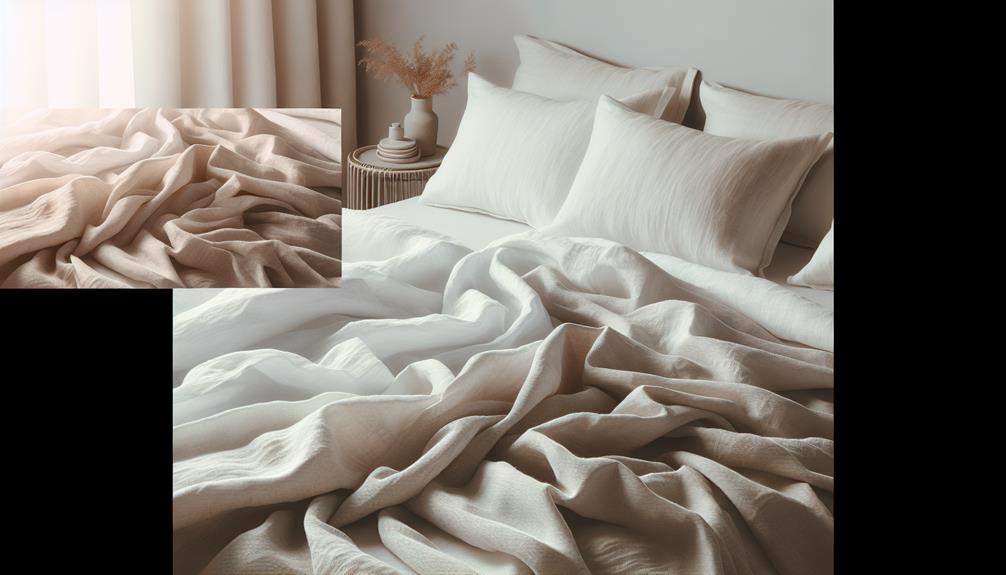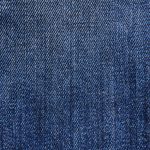I prefer linen over cotton because it keeps me cooler due to its natural heat conductivity and breathability. Linen is stronger, more durable, and requires lower thread count, lasting longer. It's eco-friendly, elegant, and hypoallergenic, great for sensitive skin. Maintenance is easy with natural antibacterial properties and resistance to shrinking. Linen feels luxurious and becomes softer with each wash. Though it costs more upfront, linen's longevity and sustainability make it cost-effective in the long run. If you explore further, you'll discover more reasons to choose linen over cotton.
Table of Contents
Key Takeaways
- Cooling and Breathability: Linen offers natural heat conductivity, moisture-wicking properties, and superior breathability compared to cotton.
- Durability and Longevity: Linen is approximately 30% stronger than cotton, with sturdy fibers that ensure exceptional absorbency and longevity.
- Environmental Impact: Linen is eco-friendly, sustainable, and supports water conservation efforts through reduced water usage.
- Styling and Aesthetic Appeal: Linen provides an elegant drape, luxurious aesthetic, and sophisticated look, making it a popular choice for high-end designs.
- Allergy-Friendly and Comfort: Linen is hypoallergenic, antimicrobial, and reduces skin irritation, making it ideal for allergy sufferers.
Cooling Properties of Linen
When it comes to staying cool and comfortable during hot weather, linen outshines cotton with its natural heat conductivity and moisture-wicking properties. Linen is highly breathable, allowing for excellent air circulation that helps cool the body, making it a top choice for warm nights.
Its moisture-wicking abilities are impressive, as linen can absorb sweat and moisture, keeping you dry and cool. Unlike cotton, linen doesn't cling to the skin when damp, which enhances its cooling effect and promotes a more restful sleep.
Additionally, the lightweight and airy texture of linen fabric further enhances its cooling properties, making it ideal for those who tend to get hot while sleeping. Choosing linen over cotton can notably improve your comfort during hot weather, providing a cool, breathable, and relaxing sleep environment.
Durability Comparison: Linen Vs Cotton
When comparing the durability of linen and cotton, one notable factor is that linen is approximately 30% stronger than cotton, ensuring a longer-lasting quality. Linen's sturdy fibers contribute to its durability, making it a preferred choice for those seeking longevity in their textiles. While cotton fibers are softer and more flexible, linen's thicker fibers give it an edge in terms of strength and resilience. Additionally, linen requires a lower thread count for quality due to its robust nature, further enhancing its durability compared to cotton.
Moreover, linen is renowned for its exceptional absorbency and longevity, outshining cotton in these aspects. The moisture absorption capacity of cotton may be higher, but linen's ability to withstand wear and tear over time sets it apart overall durability. For those looking for textiles that can stand the test of time while maintaining quality, linen emerges as a top contender due to its strong fibers and lasting performance.
Breathability Factor: Linen Wins
Linen's superiority in breathability becomes evident when considering its natural fibers and loose weave structure, outshining cotton in this aspect. The breathable nature of linen makes it a top choice for hot climates and summer attire.
Unlike cotton, linen excels in moisture-wicking, ensuring you stay cool and comfortable by drawing moisture away from your skin. Additionally, linen's exceptional air circulation properties contribute to better body temperature regulation, a key factor in maintaining comfort throughout the day.
Whether you're facing scorching temperatures or high humidity, linen proves to be the go-to option for breathable clothing that keeps you feeling fresh and dry. Its ability to enhance airflow and manage moisture sets it apart from cotton, making it the preferred fabric for those seeking the best breathability in various environments.
When it comes to staying cool and comfortable, linen truly stands out as the superior choice.
Environmental Impact: Linens Advantage
When considering the environmental impact, the advantages of linen become clear.
Its eco-friendly production practices, biodegradability, and reduced water usage make it a sustainable choice.
Eco-Friendly Production Practices
Opting for linen over cotton showcases a commitment to eco-friendly production practices with its lower environmental impact. The flax plant used to make linen requires notably less water and pesticides compared to cotton, making linen an environmentally friendly and sustainable choice.
Additionally, linen production involves lower water consumption and chemical use, further emphasizing its eco-conscious nature. Choosing linen clothing not only supports environmentally friendly practices but also contributes to a reduced carbon footprint.
Linen's biodegradability adds to its appeal as a more sustainable option over cotton. By opting for linen, you're making a conscious decision to support eco-friendly production practices that have a positive impact on the environment.
Biodegradability and Sustainability
Opting for linen instead of cotton shows a clear dedication to sustainability and eco-friendliness because of its ability to decompose and lower environmental impact. Linen, derived from flax, necessitates much less water and pesticides for cultivation compared to cotton, making it a more sustainable option. Its ability to naturally decompose ensures that at the end of its lifecycle, linen products can naturally break down without harming the environment, unlike non-biodegradable cotton. This feature aligns with eco-friendly practices and contributes to a greener future. The table below summarizes the key environmental benefits of linen over cotton:
| Aspect | Linen | Cotton |
|---|---|---|
| Biodegradability | Biodegradable | Not biodegradable |
| Water Usage | Requires less water | High water consumption |
| Pesticides | Requires fewer pesticides | High pesticide use |
Reduced Water Usage
Using linen instead of cotton significantly reduces water usage, making it a more environmentally friendly choice. Linen's sustainable farming practices require far less water compared to cotton, making it a water-efficient option.
By opting for linen, you contribute to water conservation efforts and support eco-friendly production methods. Cotton production is notorious for its high water consumption, while linen stands out for its lower water usage, helping to reduce water wastage.
The shift towards linen not only benefits the environment but also promotes sustainable practices in the textile industry. Embracing linen over cotton is a simple yet impactful way to lessen your environmental footprint and encourage the adoption of more sustainable materials.
Styling Benefits of Linen
With its elegant drape and luxurious aesthetic, linen effortlessly enhances the style of any outfit. Compared to cotton, linen offers a more sophisticated look that exudes charm and refinement. The way linen drapes beautifully adds a touch of class to any ensemble, creating a stylish and luxurious aesthetic that's hard to match.
What sets linen apart is its unique texture and appearance, which bring character and depth to outfits, making them stand out effortlessly. It's no surprise that linen is a popular choice for high-end and fashion-forward clothing designs. The natural look and feel of linen elevate the overall aesthetic of an outfit, making it a preferred choice for those seeking chic and elegant styling options.
When it comes to achieving a polished and fashionable look, linen is undeniably a fabric that can elevate any wardrobe.
Allergy-Friendly: Linens Edge
I've always struggled with allergies, so discovering linen's hypoallergenic properties was a game-changer for me.
The fact that linen is naturally antimicrobial and breathable not only reduces allergen exposure but also promotes better sleep quality.
Since making the switch to linen bedding, I've noticed a significant improvement in my skin irritations and overall comfort while sleeping.
Hypoallergenic Properties
Linen's hypoallergenic properties make it a top choice for individuals with sensitive skin or allergies. The fabric's natural anti-bacterial features help prevent allergen growth, ensuring a cleaner sleeping environment. Additionally, linen's moisture-wicking abilities and breathability reduce the risk of skin irritation, making it ideal for allergy sufferers. These inherent qualities in linen provide a safe and comfortable option for those prone to allergies.
Breathability for Comfort
Breathability plays an essential role in ensuring comfort, especially for individuals seeking an allergy-friendly bedding option like linen. Here are four reasons why linen's breathability stands out:
- Temperature Regulation: Linen's breathability allows for better air circulation, keeping you cool in warm weather and warm in cooler temperatures.
- Hypoallergenic: Linen is hypoallergenic, making it a comfortable choice for those with sensitive skin or allergies.
- Bacteria Resistant: The natural properties of linen make it resistant to bacteria growth, contributing to a healthier sleeping environment.
- Comfortable Sleep: Linen's superior breathability promotes a comfortable and restful sleep experience, ensuring you wake up feeling refreshed.
Longevity and Investment: Linens Value
With its exceptional strength and durability, linen emerges as a wise investment choice for those seeking long-lasting quality in their textiles.
Linen's fibers, being approximately 30% stronger than cotton, guarantee longevity and durability in linens. This strength means that linen can withstand the test of time, offering a value that surpasses that of many other fabrics.
Additionally, linen's thicker fibers necessitate a lower thread count for quality, making it a valuable investment in the long run. The durability of linen is further enhanced by its natural luster and exceptional absorbency, maintaining its value over time.
When investing in linen bedding, you aren't only choosing luxury but also ensuring a long-lasting experience due to its enduring nature. While linen may have an initial higher cost compared to cotton, its longevity and timeless elegance make it a worthwhile investment that will continue to bring value and comfort for years to come.
Moisture-Wicking Abilities: Linen Reigns
Making the switch to linen from cotton not only provides superior moisture-wicking abilities but also guarantees a more comfortable experience, especially in humid conditions. Linen's natural properties make it an excellent choice for those seeking breathable and absorbent clothing in warm climates.
Here are four reasons why linen reigns when it comes to moisture-wicking abilities:
- Superior Absorbency: Linen can absorb up to 20% of its weight in moisture, keeping you dry and comfortable all day long.
- Ideal for Warm Climates: Its moisture-wicking capacity makes linen perfect for hot and humid weather, allowing your body to breathe and stay cool.
- Reduces Bacterial Growth: By wicking away moisture, linen helps prevent the build-up of bacteria and odor, keeping your clothes fresh.
- Enhanced Comfort: Choosing linen over cotton ensures a drier, more comfortable experience, making it the preferred option for those who value comfort in their clothing choices.
Experience the difference with linen's moisture-wicking abilities for a fresher and more comfortable wear!
Maintenance Ease: Linens Simplicity
Maintaining linen is a breeze due to its natural properties and durability. Unlike cotton, linen requires less frequent washing thanks to its natural antibacterial qualities. This not only saves time and energy but also extends the lifespan of your bedding.
Linen's resistance to shrinking and stretching guarantees that it maintains its shape and size wash after wash, making it a reliable choice for long-term use. Additionally, linen is easier to iron compared to cotton, responding well to a hot iron for a crisp and neat finish.
The more you wash linen, the softer and more comfortable it becomes, enhancing its luxurious feel over time. Its natural fibers also offer inherent resistance to stains and dirt, making it easy to care for and keeping it looking fresh without much effort.
Embracing linen in your bedding collection not only adds a touch of luxury but also simplifies your maintenance routine.
Luxurious Feel: Linens Appeal
Linen's allure lies in its superior texture and comfort, offering a luxurious feel that sets it apart from other fabrics.
With natural cooling properties, linen provides an elegant solution for those seeking both style and functionality.
Every thread of linen exudes sophistication, making it a timeless choice for those who appreciate quality and refinement.
Superior Texture and Comfort
With its slightly rougher texture and luxurious feel, linen outshines cotton in providing a high-end appeal that exudes sophistication and comfort. Linen fabric's unique texture and upscale comfort make it a preferred choice for those seeking elegance and style.
Here are four reasons why linen surpasses cotton in texture and comfort:
- Linen's sturdier weave creates a crisp and elegant look that enhances overall comfort.
- The texture of linen adds a touch of sophistication to garments or bedding.
- Linen's luxurious feel is renowned for its premium quality and exceptional comfort.
- Opting for linen over cotton guarantees a sophisticated and upscale appearance, exuding timeless charm and elegance.
Natural Cooling Properties
Immerse yourself in the luxurious feel of linen as it naturally keeps you cool and comfortable, perfect for warm climates and summer days. Linen, a natural fiber, boasts excellent breathability, allowing air to circulate effortlessly and regulate your body temperature.
This feature makes linen ideal for creating comfortable bedding that promotes a restful night's sleep, especially during hot weather. The moisture-wicking properties of linen help absorb sweat, keeping your skin dry and fresh, making it a top choice for active individuals.
The luxury linen experience is elevated by its ability to provide an invigorating and cooling sensation, enhancing overall comfort in warm climates. Embrace the natural cooling properties of linen for a blissful and relaxing rest every night.
Elegance in Every Thread
Immerse yourself in the opulent feel of linen, where each thread exudes elegance and sophistication. When considering linen's appeal, here are four key points to understand why it stands out:
- Linen is derived from the flax plant, known for its soft and silky fibers that create a unique tactile experience.
- Its superior quality compared to other materials guarantees a luxurious touch that exudes refinement.
- Linen boasts exceptional durability, making it a long-lasting investment for your wardrobe or home textiles.
- Dating back to ancient Egypt, linen has been a symbol of luxury and prestige, adding a timeless charm to any setting.
In essence, linen's luxurious feel not only offers comfort but also enhances the aesthetic of any space with its understated elegance.
Sustainability Factor: Linens Lead
Linen's sustainability superiority shines through its minimal water and pesticide requirements, making it a top choice for eco-conscious consumers. Unlike cotton, which is water-intensive and often heavily reliant on pesticides, linen production greatly reduces water usage and pesticide application. The cultivation of flax, the plant used to make linen, contributes to a reduced environmental impact due to its biodegradability. This aspect aligns with eco-friendly practices, emphasizing the importance of considering the full lifecycle of products.
Moreover, linen's durability guarantees longevity, reducing the frequency of replacements and further supporting sustainability. By choosing linen over cotton, individuals actively participate in promoting a more environmentally conscious lifestyle. The biodegradability of linen fibers and their minimal impact on the environment make it a leading choice for those prioritizing sustainability in their textile choices. Making the switch to linen not only benefits the individual but also contributes positively to the planet, aligning with a mindset focused on sustainable living.
Cost-Effectiveness of Linen
For those seeking a practical and economical choice in textiles, the cost-effectiveness of linen stands out prominently. When considering the finest linen options, its durability and long-lasting nature make it a wise investment. Here are four reasons why choosing linen can be more cost-effective in the long run:
- Longevity: Linen is known for its longevity, lasting for decades if properly cared for. This durability means fewer replacements over time, saving money in the long term.
- Initial Investment: Despite the initial higher cost compared to cotton, the long lifespan of linen makes it a cost-effective choice over time.
- Comfort Over Time: Linen becomes softer and more comfortable with each wash, adding to its value and cost-effectiveness as it ages gracefully.
- Sustainability: The sustainable nature of linen not only benefits the environment but also your wallet by reducing the need for frequent replacements, making it a cost-effective choice for those looking for quality and longevity.
Frequently Asked Questions
Why Is Linen Better Than Cotton?
Linen is better than cotton due to its durability, moisture-wicking properties, and hypoallergenic nature. It's stronger, breathes better, and is kind to sensitive skin. Plus, it's eco-friendly and offers a luxurious, timeless appeal.
Why Do People Prefer Linen?
Linen's preference stems from its superior breathability, moisture-wicking, hypoallergenic, and antibacterial properties, making it ideal for warm weather. Its durability, comfort, and timeless elegance attract those seeking sustainable, luxurious, and eco-friendly clothing options.
What Are the Pros and Cons of Linen?
Linen offers durability, hypoallergenic properties, breathability, and eco-friendliness. It may have limited colors and feel coarse initially, but softens with washing. These qualities make it a versatile and sustainable choice for various needs.
What Are the Downsides of Linen Sheets?
The downsides of linen sheets include their initial rough texture, proneness to wrinkling, and limited color choices. Despite these drawbacks, the long-term benefits like increased comfort, durability, and luxurious feel make them a worthwhile investment.
- Jaclyn Smith Fabric Coconut: a Review of This Rayon/Polyester Blend - June 29, 2025
- Jaclyn Smith Fabric Coconut: a Review of This Rayon/Polyester Blend - June 29, 2025
- How to Get Coconut Oil off Fabric Without Washing - June 29, 2025






